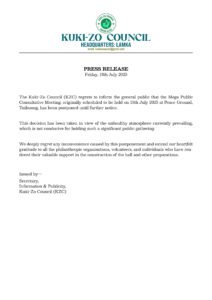Billed as a crucial step toward peace, a public consultation on a proposed ceasefire between Meitei and Kuki-Zo groups has been postponed. Many in the Kuki-Zo community say justice must come before reconciliation.
BY PC Bureau
July 18, 2025 — The Kuki-Zo Council (KZC) has y postponed its much-anticipated Mega Public Consultative Meeting, which was scheduled to take place on July 19, 2025, at the Tuibong Peace Ground.
Sources said the postponement—announced via a press release earlier today—became necessary due to a combination of factors, most notably adverse feedback from the ground and the lack of effective coordination between the Kuki-Zo Council and various civil society organisations (CSOs) representing the community.
The meeting had been convened to discuss a sensitive proposal from the Ministry of Home Affairs (MHA): a roadmap toward a “cessation of hostilities” between the Meitei and Kuki-Zo communities. Touted as a potential milestone in the conflict-scarred region, the dialogue aimed to lay the groundwork for lasting peace following the devastating ethnic violence that erupted on May 3, 2023. However, the initiative appears to have instead revealed deep-rooted skepticism and internal divisions within the Kuki-Zo community—many of whom argue that any meaningful trust-building must first be anchored in justice and accountability.Fragile Trust, Inadequate Preparation
READ: Jungle Raj Returns: Will This Be the Endgame for Nitish?
Sources within the KZC admit that the council may have underestimated the scale of consultation required to win public confidence ahead of such a critical event. “It was a miscalculation to move ahead without fully engaging community elders, CSO leaders, and public opinion influencers,” a senior council functionary told this reporter under the condition of anonymity. “The feedback we received made it clear the atmosphere was not right. We had to act before the situation became volatile.”
The council’s official press note echoed this concern, stating that the decision to postpone was made because “conditions are not conducive for holding such a significant public gathering.” The announcement has sent ripples through the community, with some viewing it as a prudent pause while others see it as a sign of growing disarray within the KZC leadership.
Fear of False Equivalence
At the heart of the resistance lies a fear shared by many Kuki-Zo citizens: that entering a formal agreement for “cessation of hostilities” would amount to an implicit admission of guilt. The violence that began in May 2023, and which continues in sporadic bursts to this day, has left hundreds dead and displaced thousands, primarily from the Kuki-Zo community. Many believe they acted only in self-defense and feel betrayed by the narrative of mutual aggression.
“We are victims, not aggressors,” said a respected community figure from Churachandpur in a telephone interview. “Our villages were burnt, our people slaughtered, and we’ve been surviving through unimaginable hardship. Signing an agreement like this without setting the record straight would be tantamount to betraying our martyrs.”
Such statements highlight a profound disconnect between the Centre’s intent and the local community’s lived reality. While the MHA views the proposal as a necessary step to bring warring factions to the table, many in the Kuki-Zo community fear that peace talks that fail to acknowledge past injustices will not bring healing—only compromise.
CSO Friction and Ground-Level Dissonance
Further complicating the picture is the apparent lack of cohesion among the region’s civil society organisations. While some CSOs remain cautiously open to dialogue, others have been openly critical, warning that a rushed agreement could permanently weaken the community’s negotiating power and dilute the gravity of past atrocities.
“There is no clarity, no transparency,” said a youth leader from a prominent Kuki-Zo organisation. “The MHA’s proposal came without proper groundwork, and the KZC should have known better than to call a meeting without first unifying our internal ranks.”

Indeed, the absence of pre-meeting consensus and the rising tensions on the ground have created a volatile environment, prompting the KZC to pull back. Yet, even as they delay, the central government appears determined to move forward. MHA officials remain optimistic, seeing the proposal not as a final word but as the start of a longer process. Insiders say the idea is far from abandoned and will likely return in a restructured form, possibly with more clarity and safeguards.
As things stand, the Kuki-Zo Council faces the dual challenge of rebuilding public trust while maintaining lines of communication with the MHA. Any future meeting will require more than just logistical readiness—it will demand a moral and strategic consensus among a deeply wounded people.
The coming days will test the maturity and unity of the Kuki-Zo leadership as well as the Centre’s willingness to revise its approach. The dream of peace may not be entirely out of reach, but it cannot be achieved through shortcuts or imposed narratives. For genuine reconciliation, the process must be rooted in truth, justice, and the dignity of those who have already suffered too much.
READ: Historic Verdict: SC Grants Equal Inheritance Rights to Tribal Women














